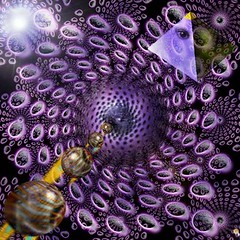Robin Hanson, an economist, physicist and transhumanist, posited a disturbing hypothesis a few years ago about the Many Worlds interpretation of quantum mechanics and the potential for other worlds to interact with our own.
Recently, New Scientist published an account of Hanson's work that doesn't quite get the gyst of it, suggesting that alternate worlds may interact with our own with disastrous consequences. In the article, "Is Our Universe About to be Mangled?" New Scientist suggests that "our universe may one day be obliterated or assimilated by a larger universe."
For those unfamiliar, the Many Worlds Interpretation (MWI) is one of many multiverse hypotheses in physics and philosophy. It's currently considered a mainstream interpretation along with the Copenhagen and consistent histories interpretations.
The MWI suggests that at every moment the universe branches off into a multitude of sets that are based on probabilities. It's like a copy-and-paste for the universe, but each time the paste button is pressed an entire set of variable universes is spawned. And with each passing moment in those parallel universes, more sets are spawned, and so on.
Hanson, who works out of George Mason University in Fairfax, Virginia, published his thesis about "mangled universes" in 2003 and revised it just last year. In the piece, titled "When Worlds Collide: Mangled Worlds Quantum Mechanics," Hanson doesn't so much describe a scenario in which a universe obliterates another as he is describing an observational selectional process and anthropic process that selects for consciousness-friendly universes.
In other words, as you are copied a near infinite number of times into alternate universes, many of your copies are pasted into untenable universes. Like an unviable fetus in a womb, your copied existence will be miscarried in a universe that can't support it.
"In Everett's many worlds interpretation, quantum measurements are considered to be decoherence events," writes Hanson, "If so, then inexact decoherence may allow large worlds to mangle the memory of observers in small worlds, creating a cutoff in observable world size. Smaller world are mangled and so not observed. If this cutoff is much closer to the median measure size than to the median world size, the distribution of outcomes seen in unmangled worlds follows the Born rule. Thus deviations from exact decoherence may allow the Born rule to be derived via world counting, with a finite number of worlds and no new fundamental physics."
There's a truly Darwinian aspect to this process, but don't worry. You will not be able to observe yourself being mangled by an unviable universe.
Which has me in an odd way thinking about the possibility of quantum immortality. This is the speculation that is derived from the quantum suicide thought experiment. Essentially, this argument suggests that if the many-worlds interpretation of quantum mechanics is correct, then a conscious observer can never cease to exist -- regardless of how improbable their existence is from one moment to the next.
Tags: quantum mechanics, many worlds, quantum immortality.


No comments:
Post a Comment